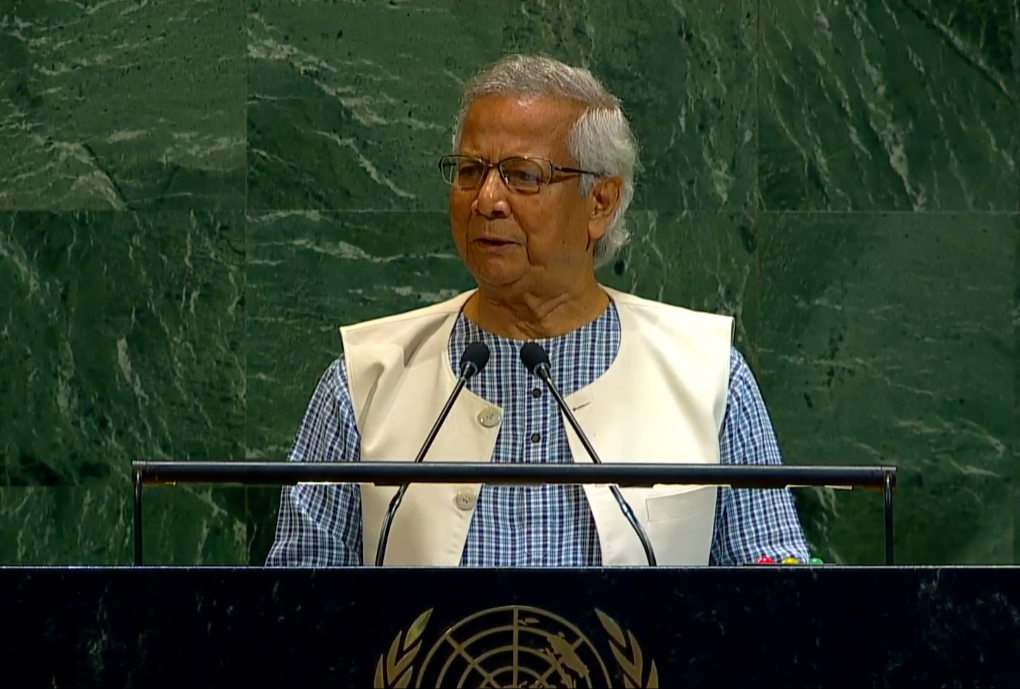CA Highlights Bangladesh’s Democratic Progress and Reforms at UNGA
Introduction to the Occasion
On September 26, 2025, Professor Muhammad Yunus, the Chief Adviser of Bangladesh, delivered a significant address at the 80th Session of the United Nations General Assembly (UNGA) in New York. This address came at a momentous time as the world gathered to celebrate the 80th anniversary of the UN Charter, a symbol of global unity and cooperation.
Acknowledging Milestones
In his opening remarks, Prof. Yunus congratulated the President of the General Assembly and fellow Member States, marking the occasion as a celebration not only of the past but a call to look forward. He recognized the achievements of the UN, while highlighting the critical need for reforms that amplify the voices of developing nations within the global framework.
Bangladesh’s Democratic Transformation
Reflecting on Bangladesh’s journey, Yunus pointed to the July Uprising of 2024 as a pivotal moment that reinvigorated the democratic spirit in the country. He noted that the youth played an instrumental role in this transformation, advocating for change that has now been codified in the “July Declaration.” This historical document outlines the country’s commitment to democracy and progress.
Institutional Accountability and Governance Reforms
In his speech, Yunus elaborated on the strides Bangladesh has made toward enhancing institutional accountability, preparing for free and fair elections, and implementing comprehensive economic reforms. These efforts aim to foster transparency, stability, and increased investment opportunities—a crucial element for a developing nation striving for progress.
Commitment to Human Rights
A cornerstone of his address was Bangladesh’s firm commitment to human rights. Yunus emphasized the country’s accession to various international conventions and cooperation with the UN Human Rights Office. He articulated the measures taken to address past abuses, signifying a dedication to uphold human rights standards in governance.
Tribute to Bangladeshi Expatriates
Acknowledging the invaluable contribution of Bangladesh’s expatriate workforce, Yunus highlighted how migrant workers continue to send home record levels of remittances. This inflow not only supports families but also plays a crucial role in bolstering the nation’s economy. He argued that the contributions of these individuals are equally valuable in their host countries and underscore the importance of global solidarity.
Focus on the Rohingya Crisis
Yunus brought attention to the ongoing Rohingya crisis, urging the global community to enhance support for this vulnerable population. He called for a High-Level Conference on Rohingya scheduled for September 30, 2025, emphasizing the necessity for collective action to address their plight.
Condemnation of Violence in Gaza
In a passionate segment of his speech, Yunus condemned the violence occurring in Gaza, calling it a genocide. He urged Member States to take immediate action to halt the ongoing atrocities, reinforcing Bangladesh’s unwavering support for a two-state solution as a pathway to peace.
Advocating for Equal Opportunities
Continuing his advocacy, Yunus spoke on Bangladesh’s commitment to gender equality, climate action, and the empowerment of youth. He argued for equitable sharing of technological advancements, including artificial intelligence, emphasizing that these innovations should benefit all nations transparently.
Vision for a Sustainable Future
Distinctly, Yunus articulated his vision for a “three-zero world”: zero carbon emissions, zero net wealth concentration, and zero unemployment. This aspirational vision embodies the multifaceted challenges facing the global community and emphasizes Bangladesh’s proactive stance in tackling these issues head-on.
Shared Commitment in Governance
During Yunus’s address, government advisers and representatives from major political parties in Bangladesh were present, showcasing a united front in the country’s commitment to democracy and reform. This collective representation signified that the quest for a better future transcends politics and resonates with the core values of collaboration and shared purpose.
By detailing these multifaceted themes, Prof. Yunus’s address not only serves as an illustration of Bangladesh’s journey but also resonates as a call for global collaboration, reinforcing connections that bind nations together in the pursuit of justice, equality, and a sustainable future.



